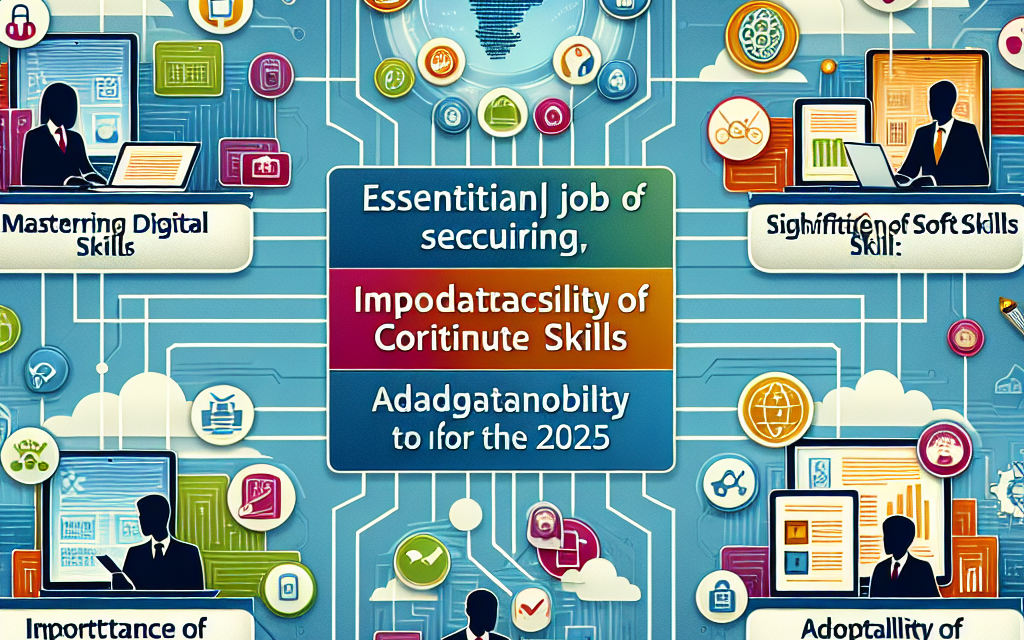“Unlock Your Future: Essential Insights for Landing Your Dream Job in 2025.”
Introduction
In an ever-evolving job market, securing a position in 2025 requires a strategic approach that combines adaptability, technological proficiency, and a strong personal brand. As industries continue to transform due to advancements in automation, artificial intelligence, and remote work dynamics, job seekers must equip themselves with essential skills and insights to stand out. Understanding emerging trends, honing relevant competencies, and effectively leveraging networking opportunities will be crucial for navigating the competitive landscape. This guide explores key strategies and insights that will empower individuals to successfully secure employment in the future workforce.
Networking Strategies for Job Seekers
In the ever-evolving landscape of job searching, networking remains a cornerstone strategy for securing employment, particularly as we approach 2025. As industries adapt to technological advancements and shifting economic conditions, the importance of building and maintaining professional relationships cannot be overstated. To navigate this complex environment effectively, job seekers must adopt innovative networking strategies that align with contemporary practices.
First and foremost, leveraging digital platforms is essential in today’s job market. Social media networks, particularly LinkedIn, have transformed the way professionals connect. By creating a compelling profile that highlights skills, experiences, and accomplishments, job seekers can attract the attention of potential employers and industry peers. Engaging with content relevant to one’s field, such as sharing articles or commenting on posts, not only demonstrates expertise but also fosters connections with like-minded individuals. Furthermore, participating in online groups and forums can provide valuable insights into industry trends and job openings, thereby expanding one’s professional network.
In addition to online networking, attending industry-specific events remains a vital strategy. Conferences, workshops, and seminars offer opportunities to meet professionals face-to-face, facilitating deeper connections than those formed through digital interactions. When attending these events, it is crucial to approach networking with a genuine mindset. Rather than merely exchanging business cards, job seekers should focus on building meaningful relationships by engaging in conversations that showcase their interests and expertise. This approach not only enhances the likelihood of being remembered but also opens doors to potential job opportunities.
Moreover, informational interviews serve as an effective tool for expanding one’s network. By reaching out to professionals in desired roles or industries, job seekers can gain insights into career paths and organizational cultures. These conversations often lead to valuable advice and may even result in referrals for job openings. It is important to approach these interviews with a clear purpose, preparing thoughtful questions that demonstrate genuine interest in the other person’s experiences. Following up with a thank-you note reinforces the connection and keeps the lines of communication open for future interactions.
As job seekers cultivate their networks, it is equally important to give back to the community. Engaging in mentorship, volunteering, or sharing knowledge through workshops can enhance one’s reputation and establish credibility within the industry. By positioning oneself as a resource for others, job seekers not only strengthen their networks but also create a supportive environment that fosters mutual growth. This reciprocal approach to networking can lead to unexpected opportunities, as individuals are more likely to recommend those who have positively impacted their professional lives.
Furthermore, maintaining relationships over time is crucial for effective networking. Regularly checking in with contacts, whether through social media interactions or occasional emails, helps keep connections alive. Sharing relevant articles or updates about one’s career can serve as a reminder of one’s expertise and interests, ensuring that contacts think of the job seeker when opportunities arise.
In conclusion, as the job market continues to evolve, adopting strategic networking practices is essential for job seekers aiming to secure employment in 2025. By leveraging digital platforms, attending industry events, conducting informational interviews, giving back to the community, and maintaining relationships, individuals can create a robust professional network that not only enhances their job search but also contributes to long-term career success. Embracing these strategies will empower job seekers to navigate the complexities of the modern job market with confidence and resilience.
The Importance of Personal Branding
In the competitive job market of 2025, personal branding has emerged as a crucial element for job seekers aiming to distinguish themselves from the crowd. As employers increasingly rely on digital platforms to assess potential candidates, the way individuals present themselves online can significantly influence hiring decisions. Therefore, understanding the nuances of personal branding is essential for anyone looking to secure a position in this evolving landscape.
To begin with, personal branding encompasses the unique combination of skills, experiences, and values that an individual conveys to the world. It is not merely about creating a polished online presence; rather, it involves a strategic approach to how one communicates their professional identity. In an age where first impressions are often formed through social media profiles and online portfolios, it is imperative to curate a consistent and authentic narrative that resonates with prospective employers. This narrative should reflect not only professional achievements but also personal values and aspirations, thereby creating a holistic view of the individual.
Moreover, the significance of personal branding extends beyond mere visibility. A well-crafted personal brand can foster trust and credibility, which are vital in establishing professional relationships. When potential employers encounter a candidate whose online presence aligns with their resume and interview persona, they are more likely to perceive that individual as reliable and competent. This alignment is particularly important in 2025, as companies increasingly prioritize cultural fit and alignment with organizational values. Therefore, job seekers must ensure that their personal brand authentically represents who they are and what they stand for.
In addition to authenticity, adaptability is another key component of effective personal branding. The job market is continuously evolving, influenced by technological advancements and shifting industry demands. As such, individuals must be prepared to update their personal brand to reflect new skills, experiences, and insights. This adaptability not only demonstrates a commitment to professional growth but also signals to employers that the candidate is proactive and forward-thinking. Engaging in continuous learning and skill development can enhance one’s personal brand, making it more relevant and appealing in a dynamic job market.
Furthermore, leveraging various platforms to amplify one’s personal brand is essential. In 2025, social media platforms, professional networking sites, and personal websites serve as powerful tools for showcasing expertise and building a professional network. By actively participating in industry discussions, sharing relevant content, and connecting with thought leaders, individuals can enhance their visibility and establish themselves as knowledgeable professionals in their field. This proactive engagement not only broadens one’s network but also positions the individual as a valuable resource within their industry.
Finally, it is important to recognize that personal branding is an ongoing process. As individuals progress in their careers, their personal brand should evolve to reflect new experiences and insights. Regularly reassessing and refining one’s brand ensures that it remains relevant and impactful. By embracing this continuous journey of self-presentation, job seekers can effectively navigate the complexities of the job market in 2025.
In conclusion, personal branding is an indispensable aspect of securing a job in 2025. By cultivating an authentic, adaptable, and visible personal brand, individuals can significantly enhance their prospects in a competitive landscape. As the job market continues to evolve, those who prioritize personal branding will be better positioned to seize opportunities and achieve their career aspirations.
Skills in Demand for 2025
As we look ahead to 2025, the job market is poised to undergo significant transformations driven by technological advancements, evolving business needs, and shifting societal expectations. Understanding the skills that will be in demand is crucial for job seekers aiming to position themselves competitively in this dynamic landscape. One of the most prominent trends is the increasing reliance on digital technologies across various sectors. Consequently, proficiency in digital literacy is no longer optional; it has become a fundamental requirement. This encompasses not only basic computer skills but also an understanding of data analytics, cybersecurity, and digital marketing. As organizations continue to harness the power of data to inform decision-making, the ability to analyze and interpret data will be invaluable.
Moreover, as automation and artificial intelligence (AI) become more integrated into everyday business operations, there is a growing need for individuals who can work alongside these technologies. This means that skills related to AI, machine learning, and robotics will be highly sought after. Professionals who can design, implement, and manage AI systems will find themselves in high demand, as companies look to leverage these tools to enhance efficiency and productivity. In addition to technical skills, soft skills are equally important in the evolving job market. Employers are increasingly prioritizing attributes such as adaptability, emotional intelligence, and critical thinking. The ability to navigate change and demonstrate resilience in the face of challenges will be essential as industries continue to adapt to rapid technological shifts.
Furthermore, collaboration and communication skills will remain vital as remote and hybrid work models become more entrenched. The ability to work effectively in diverse teams, often across geographical boundaries, will be a key differentiator for job candidates. As organizations embrace a more global workforce, cultural competence and the ability to engage with colleagues from various backgrounds will enhance team dynamics and drive innovation. In addition to these interpersonal skills, creativity is emerging as a critical asset in the workplace. As automation takes over routine tasks, the human capacity for creative problem-solving and innovative thinking will set individuals apart. Employers will increasingly seek individuals who can think outside the box and contribute fresh ideas that drive business growth.
Moreover, sustainability and environmental awareness are becoming central to many organizations’ missions. As companies strive to meet their corporate social responsibility goals, skills related to sustainability practices, environmental management, and ethical decision-making will be in high demand. Professionals who can integrate sustainable practices into business strategies will not only enhance their employability but also contribute to the broader goal of creating a more sustainable future. Additionally, the healthcare sector is expected to continue its expansion, driven by an aging population and advancements in medical technology. Skills related to healthcare management, telemedicine, and health informatics will be increasingly valuable as the industry evolves to meet new challenges.
In conclusion, the job market in 2025 will require a diverse skill set that combines technical expertise with essential soft skills. As digital technologies continue to reshape industries, individuals who can adapt, collaborate, and innovate will be well-positioned for success. By focusing on developing these in-demand skills, job seekers can enhance their employability and thrive in an ever-changing professional landscape. As we move forward, staying informed about industry trends and continuously updating one’s skill set will be paramount in navigating the complexities of the future job market.
Navigating Remote Work Opportunities
As the landscape of employment continues to evolve, particularly in the wake of the global pandemic, remote work opportunities have become increasingly prevalent. In 2025, navigating this new terrain will require a strategic approach that encompasses not only the technical skills necessary for remote work but also an understanding of the unique dynamics that come with it. To begin with, it is essential to recognize that remote work is not merely a trend but a fundamental shift in how businesses operate. This shift has opened up a plethora of job opportunities that transcend geographical boundaries, allowing individuals to seek employment with companies located anywhere in the world.
To effectively secure a remote position, candidates must first ensure that their digital presence is polished and professional. This includes maintaining an updated LinkedIn profile, showcasing relevant skills, and engaging with industry-related content. A strong online presence not only enhances visibility but also demonstrates a candidate’s commitment to their professional development. Furthermore, it is advisable to tailor resumes and cover letters to highlight experiences that are particularly relevant to remote work, such as self-motivation, time management, and effective communication skills. These attributes are crucial, as remote work often requires individuals to operate independently while still collaborating with team members across various time zones.
In addition to refining one’s online presence, candidates should also familiarize themselves with the tools and technologies that facilitate remote work. Proficiency in platforms such as Zoom, Slack, and project management software like Trello or Asana can significantly enhance a candidate’s appeal to potential employers. Understanding how to leverage these tools not only demonstrates technical competence but also indicates an ability to adapt to the demands of a remote work environment. Moreover, candidates should consider obtaining certifications in relevant software or methodologies, as this can further distinguish them from other applicants.
Networking remains a vital component of the job search process, even in a remote context. Engaging with professionals in one’s field through virtual events, webinars, and online forums can lead to valuable connections and insights into job openings. Additionally, joining industry-specific groups on social media platforms can provide access to job postings and discussions that may not be widely advertised. By actively participating in these communities, candidates can position themselves as knowledgeable and engaged professionals, which can be advantageous when seeking remote opportunities.
As the job market becomes increasingly competitive, it is also important for candidates to develop a personal brand that reflects their unique skills and experiences. This can be achieved through creating a professional website or portfolio that showcases past projects, testimonials, and a clear narrative of one’s career journey. A well-crafted personal brand not only enhances credibility but also allows candidates to stand out in a crowded field.
Finally, candidates should remain adaptable and open-minded throughout their job search. The nature of remote work is continually evolving, and being willing to embrace change can lead to unexpected opportunities. Whether it involves exploring freelance positions, part-time roles, or contract work, flexibility can be a significant asset in securing employment. By approaching the job search with a proactive mindset and a willingness to learn, candidates can successfully navigate the remote work landscape in 2025 and beyond. In conclusion, the key to thriving in this new era of employment lies in a combination of strategic online presence, technical proficiency, networking, personal branding, and adaptability.
Leveraging Social Media for Job Searches
In the rapidly evolving job market of 2025, leveraging social media has become an indispensable strategy for job seekers aiming to enhance their visibility and connect with potential employers. As platforms like LinkedIn, Twitter, and even Instagram continue to gain traction in professional networking, understanding how to effectively utilize these tools can significantly impact one’s job search success. To begin with, it is crucial to recognize that social media is not merely a platform for social interaction; it has transformed into a powerful resource for professional development and recruitment.
First and foremost, creating a polished and professional online presence is essential. This involves curating a LinkedIn profile that not only highlights one’s skills and experiences but also reflects a personal brand that resonates with industry standards. A well-crafted profile should include a professional photograph, a compelling headline, and a detailed summary that encapsulates one’s career aspirations and achievements. Furthermore, it is advisable to regularly update this profile with new skills, certifications, and accomplishments, as this demonstrates a commitment to continuous learning and professional growth.
In addition to maintaining an impressive profile, engaging with content on social media platforms can significantly enhance visibility. Sharing industry-related articles, commenting on posts, and participating in discussions can position job seekers as knowledgeable and active members of their professional communities. This engagement not only helps in building a network but also showcases one’s expertise and interests to potential employers. Moreover, following companies of interest and engaging with their content can provide insights into their culture and values, which is invaluable during the application process.
Networking through social media is another critical aspect of the job search. Connecting with industry professionals, alumni, and recruiters can open doors to opportunities that may not be advertised through traditional channels. It is important to approach networking with authenticity; personalized messages that express genuine interest in the recipient’s work can foster meaningful connections. Additionally, participating in relevant groups and forums can facilitate discussions that lead to job referrals and insider information about job openings.
As the job market becomes increasingly competitive, utilizing social media for job searches also involves staying informed about industry trends and employer expectations. Following thought leaders and industry experts can provide valuable insights into emerging skills and competencies that are in demand. This knowledge can guide job seekers in tailoring their applications and preparing for interviews, ensuring they align their qualifications with what employers are seeking.
Furthermore, it is essential to be mindful of one’s digital footprint. Employers often conduct online searches to gauge a candidate’s suitability, making it imperative to manage one’s online presence carefully. This includes reviewing privacy settings on personal accounts and ensuring that any public content reflects professionalism. Job seekers should also consider creating a personal website or portfolio that showcases their work, providing a centralized location for potential employers to view their accomplishments.
In conclusion, leveraging social media for job searches in 2025 requires a strategic approach that encompasses building a professional online presence, engaging with relevant content, networking authentically, and staying informed about industry trends. By embracing these practices, job seekers can enhance their visibility, expand their professional networks, and ultimately increase their chances of securing desirable employment opportunities. As the landscape of job searching continues to evolve, those who adeptly navigate the digital realm will find themselves at a distinct advantage in the competitive job market.
Crafting a Standout Resume
In the competitive job market of 2025, crafting a standout resume is paramount for job seekers aiming to capture the attention of potential employers. As hiring practices evolve, it becomes increasingly important to understand the nuances of resume writing that can set candidates apart from the crowd. To begin with, a well-structured resume should not only highlight relevant skills and experiences but also reflect an understanding of the specific industry and role for which one is applying. This means tailoring each resume to align with the job description, emphasizing keywords and phrases that resonate with the employer’s needs.
Moreover, the visual presentation of a resume plays a crucial role in making a strong first impression. In an age where digital applications are the norm, utilizing a clean, professional layout can significantly enhance readability. This includes using clear headings, bullet points for easy scanning, and a consistent font style. Additionally, incorporating subtle design elements, such as a touch of color or a unique format, can help a resume stand out without overwhelming the reader. However, it is essential to strike a balance; the design should complement the content rather than distract from it.
As candidates consider the content of their resumes, it is vital to focus on quantifiable achievements rather than merely listing job responsibilities. Employers are increasingly looking for evidence of impact, so including specific metrics—such as sales figures, project completion rates, or customer satisfaction scores—can provide tangible proof of one’s capabilities. This approach not only demonstrates competence but also showcases a results-oriented mindset, which is highly valued in today’s fast-paced work environment.
In addition to achievements, incorporating a summary statement at the beginning of the resume can effectively capture the essence of a candidate’s professional identity. This brief overview should encapsulate key skills, experiences, and career aspirations, providing a snapshot that entices hiring managers to delve deeper into the resume. Furthermore, including relevant certifications or ongoing education can signal a commitment to professional development, which is increasingly important in a rapidly changing job landscape.
Networking and personal branding also play significant roles in the job search process, and these elements should be reflected in the resume. Candidates should consider including links to professional online profiles, such as LinkedIn, or personal websites that showcase their work. This not only provides additional context but also allows employers to see a more comprehensive view of the candidate’s professional journey. Additionally, engaging in networking opportunities can lead to referrals, which are often more effective than traditional applications.
As the job market continues to evolve, it is also essential for candidates to stay informed about industry trends and emerging skills. This knowledge can inform the resume content, ensuring that candidates highlight the most relevant and sought-after skills. For instance, familiarity with new technologies or methodologies can be a significant advantage, particularly in fields that are rapidly advancing.
In conclusion, crafting a standout resume in 2025 requires a strategic approach that combines tailored content, effective presentation, and an understanding of industry dynamics. By focusing on quantifiable achievements, maintaining a professional layout, and incorporating elements of personal branding, candidates can create a compelling narrative that resonates with potential employers. Ultimately, a well-crafted resume serves not only as a reflection of one’s qualifications but also as a powerful tool in navigating the complexities of the modern job market.
Preparing for Virtual Interviews
As the job market continues to evolve, particularly in the wake of the global pandemic, preparing for virtual interviews has become an essential skill for job seekers in 2025. The shift towards remote work has not only changed the way companies operate but has also transformed the interview process. Consequently, candidates must adapt to this new landscape to enhance their chances of securing employment. Understanding the nuances of virtual interviews is crucial, as it requires a different approach compared to traditional face-to-face meetings.
To begin with, candidates should ensure that they are familiar with the technology that will be used during the interview. This includes understanding the platform, whether it be Zoom, Microsoft Teams, or another video conferencing tool. It is advisable to conduct a test run prior to the interview to troubleshoot any potential technical issues. This preparation not only alleviates anxiety but also demonstrates professionalism and a proactive attitude to potential employers. Furthermore, candidates should ensure that their internet connection is stable and that they have a backup plan in case of technical difficulties, such as a phone number to call if the video connection fails.
In addition to technical readiness, the physical environment plays a significant role in virtual interviews. Candidates should choose a quiet, well-lit space that is free from distractions. A neutral background is preferable, as it allows the interviewer to focus on the candidate rather than the surroundings. Moreover, candidates should dress professionally, just as they would for an in-person interview. This not only helps create a positive impression but also boosts the candidate’s confidence. It is important to remember that first impressions are still vital, even in a virtual setting.
Moreover, effective communication is paramount during virtual interviews. Candidates should practice speaking clearly and at a moderate pace, as audio quality can sometimes be compromised. Additionally, maintaining eye contact by looking at the camera rather than the screen can create a more engaging interaction. Non-verbal cues, such as nodding and smiling, can also convey attentiveness and enthusiasm. Practicing these skills with a friend or family member can help candidates feel more comfortable and polished during the actual interview.
Furthermore, candidates should be prepared to discuss their experiences and qualifications in a concise and compelling manner. This involves not only reviewing common interview questions but also formulating thoughtful responses that highlight relevant skills and achievements. Utilizing the STAR method—Situation, Task, Action, Result—can be particularly effective in structuring responses to behavioral questions. By providing specific examples, candidates can illustrate their problem-solving abilities and adaptability, which are highly valued traits in today’s job market.
Lastly, candidates should remember to follow up after the interview. Sending a thank-you email reiterating interest in the position and expressing gratitude for the opportunity can leave a lasting impression. This simple gesture demonstrates professionalism and reinforces the candidate’s enthusiasm for the role. In conclusion, as the job market continues to adapt to new realities, mastering the art of virtual interviews is essential for job seekers in 2025. By focusing on technology, environment, communication, preparation, and follow-up, candidates can position themselves as strong contenders in a competitive landscape. Embracing these strategies will not only enhance their interview performance but also increase their chances of securing the desired position.
Q&A
1. **What skills will be most in demand in 2025?**
Skills in artificial intelligence, data analysis, cybersecurity, and soft skills like communication and adaptability will be in high demand.
2. **How important is remote work experience for job seekers in 2025?**
Remote work experience will be highly valued, as many companies will continue to offer flexible work arrangements.
3. **What role does networking play in securing a job in 2025?**
Networking will remain crucial, as personal connections can lead to job opportunities and referrals.
4. **How can candidates demonstrate their adaptability?**
Candidates can showcase adaptability by highlighting experiences where they successfully navigated change or learned new skills quickly.
5. **What is the significance of personal branding in 2025?**
Personal branding will be essential for standing out in a competitive job market, as it helps convey a candidate’s unique value proposition.
6. **How should candidates approach job applications in 2025?**
Candidates should tailor their resumes and cover letters to each job, emphasizing relevant skills and experiences that align with the job description.
7. **What role will continuous learning play in career advancement?**
Continuous learning will be vital for career advancement, as staying updated with industry trends and acquiring new skills will enhance employability.
Conclusion
In conclusion, securing a job in 2025 will require a combination of adaptability, continuous learning, and strong digital skills. Candidates must embrace emerging technologies, cultivate soft skills such as communication and teamwork, and build a robust professional network. Additionally, staying informed about industry trends and demonstrating a proactive approach to career development will be crucial in navigating the evolving job market.





